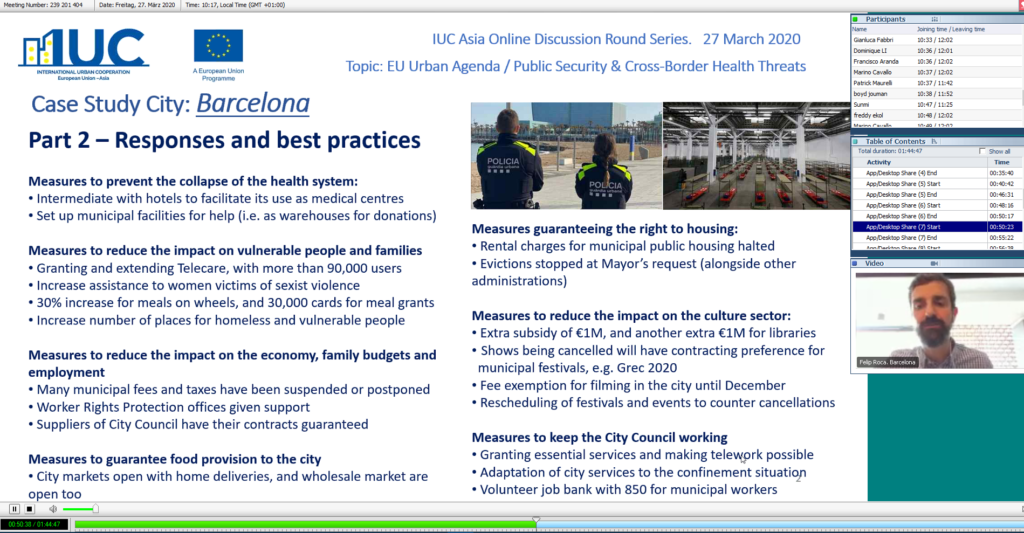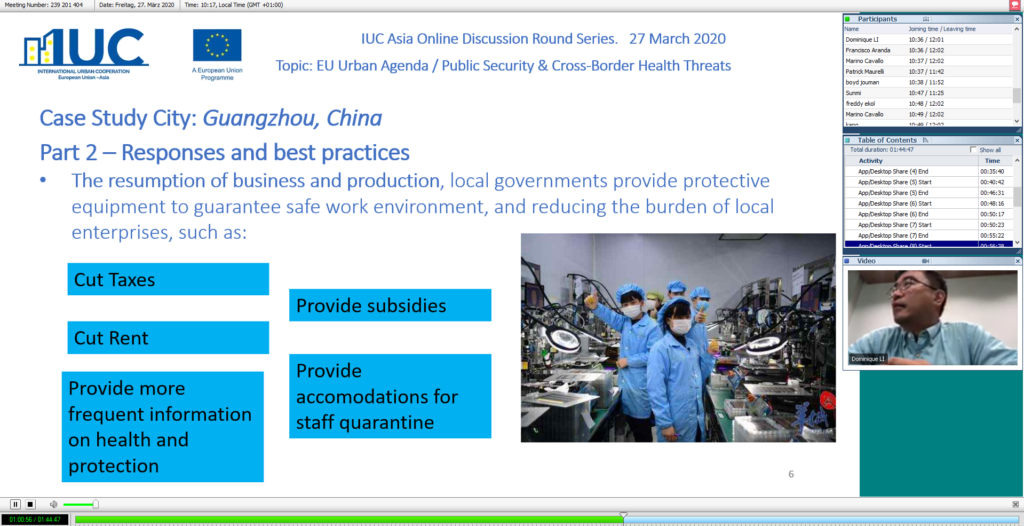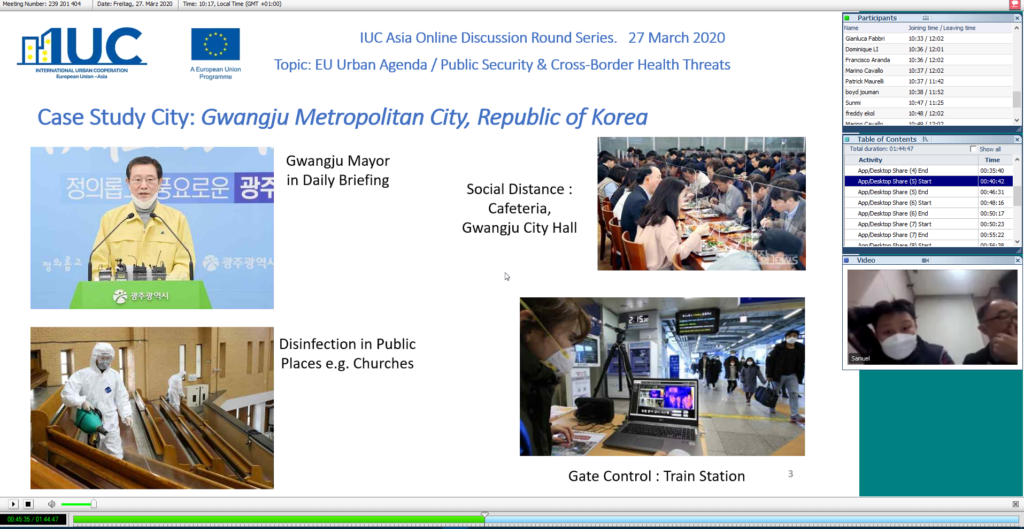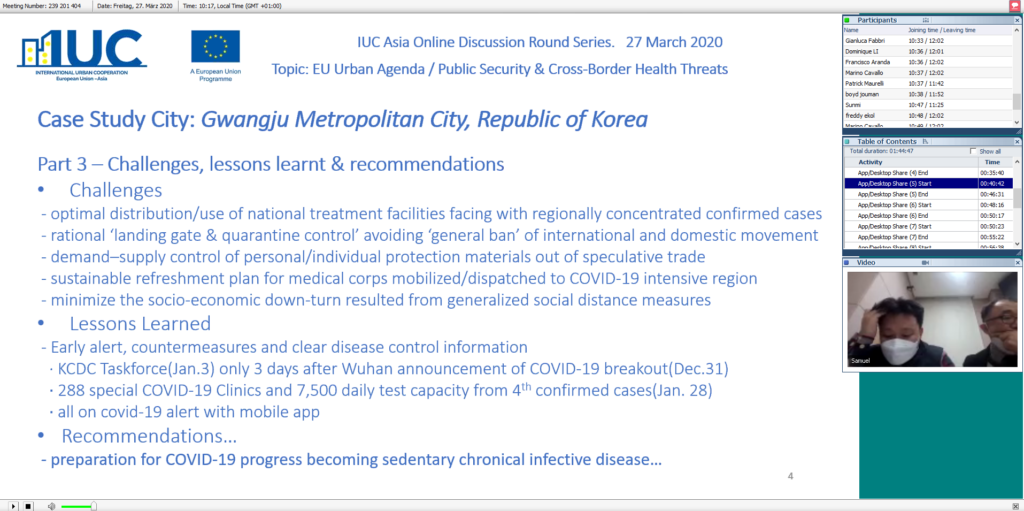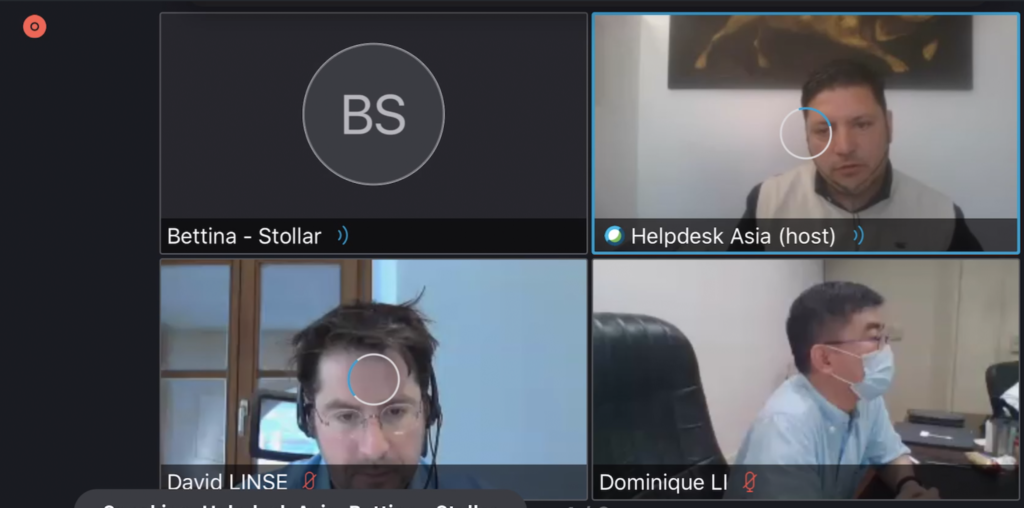Due to the corona crisis and the high interest from EU and Asian cities to identify the added value of international cooperation for disaster preparedness at local level, the IUC project launched an online exchange session. The team explained the link of the EU Urban Agenda to the current crisis and the EU support to cities in several dimensions of the crisis. The team explained the main elements of the EU Coronavirus Response Investment Initiative (CRII), a fast and comprehensives support package from untapped EU Cohesion Policy resources. As stated by the EU Urban Agenda team, “It is likely that what we are experiencing now will have far-reaching repercussions for the urban community – factors like population density, city planning and technology will come under scrutiny. Like all epidemics (and pandemics), the current one will most likely serve as a catalyst for urban transformation”.
The goal of the informal online exchange was to create a community of practice among urban developing experts and to identify topics for future webinars in this area. It was the first in a series of thematic networks online discussion rounds to be implemented in the coming months.
Summary
There is a bunch of best practices in Europe and in Asia for coping with the crisis: see for instance Eurocities Covid19 portal and UCLG ASPAC portal. Some remarkable ones introduced at the meeting:
-
- Mannheim “Cope with COVID” portal for positive initiatives in all the hustle and bustle and mostly bad news. The initiative aims at creating digital offers for social, economic and cultural exchange, to test the interaction in virtual space. Also, infographics in “simple language” for foreign people have been developed to easily understand how to behave to mitigate the corona spread.
- Fast online response to subsidies requirements by local business in Stuttgart. The city region has also re-established the high frequency of public transport in order to avoid crowded trains and buses.
- In Granada, ICT Enterprises (from the OnTech Granada Cluster) are developing tools, surgical masks and respirators with 3D printers. The facilities of the University in the Health Technology Park are going to be converted in a full medicalized area (as a new hospital).
- In Nice, the authority has arranged to maintain nursery and schools for mobilised people (medical personnel, security services, etc.). In order to implement social distancing, also drones inform people to follow containment rules.
- In Barcelona, the city has developed a highly intuitive social media app for the elderly so that they can interact from home. Also, several measures have been implemented to reduce the impact on vulnerable people and families, including extended Telecare, with more than 90,000 users.
- In Rome, libraries are making their catalogue available online for free with the #cultureathome campaign, granting FREE online access to over 7100 periodicals from 90 countries in 40 different languages.
- In Bologna, the metropolitan authority is developing cooperative/smart work approaches focusing on enhanced e-services for citizens. In cooperation with the university, the City is also developing new online cooperation tools for virtual communities of learning and approaches to reshape the methods of transport in the city as a lesson learned in the corona crisis.
- In Hamburg protective shields have been launched as support system for business and cultural ecosystems.
- Also in Melbourne Australia, a system of smarty grants and sponsorships has been spanned.
- In Jakarta (Indonesia), the schools are closed for 14 days starting 16 March to 2 April and imposed the work from home for government officers (social distancing) until further notice.
- Guangzhou (China) underlines the need for an effective complete emergency response network and strict rules for fighting epidemic. At the same time, the city is now positively adapting measures to the resumption of business and production, including the provision of protective equipment to guarantee a safe work environment, and reducing the burden of local enterprises. Confidence and international unity, cooperation and coordination are key.
- Gwangju (Korea) shared several best practices including early alert, anticipatory countermeasures, clear and open information on COVID-Control. Inter-city cooperation in Korea is implemented in the so-called East-West Alliance-Gwangju-Daegu: Medical team and equipment dispatch, Patient transfer. An Emergency Fund for livelihood of the vulnerable has been launched too.
- In Penampang (Malaysia), the city council has implemented social distancing measures and is now developing a package to support local economy.
There is a strong interest among cities to cooperate in both mitigation measures for the Covid19 crisis and recovery measures for the economy, including:
-
- Ensuring the supply of personal protection equipment for health and municipal workers engaged in essential services (mentioned by Nice and Mannheim)
- Setting up local investment funds to support innovative start-ups which have financial difficulties caused by the CORONA-Crisis (Nice, Mannheim)
- Foster city to city cooperation with new health/biotechnology clustering projects (Granada)
- Innovative measures to reduce the impact on the culture sector like contracting preference for cancelled shows at municipal festivals, e.g. Grec 2020 (Nice)
- Central role of digital services in maintaining a certain level of social cohesion and economic activity in the cities (Barcelona)
Report
Presentations
Cross-Border Health Threat – Intro PG
Cross-Border Health Threat – MANNHEIM
Cross-Border Health Threat – Stuttgart
Cross-Border Health Threat V2- Nice-France
Cross-Border Health Threat- Guangzhou GDD global star-1
Cross-Border Health Threat – BARCELONA
Cross-Border Health Threat – Granada (Spain)_ICT Cluster
Cross-Border Health Threat – Granada City
Cross-Border_Health_Threat_-_Gwangju(KOR)_k
Cross-Border_Health_Threat Indonesia – UCLG ASPAC
Cross-Border_Health_Threat Penampang
Pictures & Participants



